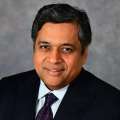Professor of David Geffen School of Medicine at UCLA in collaboration with Professor , of Oxford University has been awarded a prestigious Leducq International Network of Excellence Program Award of $8 million to set up a major new transatlantic network linking world leading researchers from the United States and Europe to develop bioelectronics and therapies that target the nervous system to treat heart diseases.
The autonomic nervous system (ANS) is a major controller of the cardiovascular system and a key player in the pathogenesis of heart disease. ANS dysfunction can lead to pathologically increased heart rate through increased sympathetic and reduced parasympathetic tone, contributing to arrhythmias and sudden cardiac death (SCD) which claims up to 12 million lives/year globally.
An international team of researchers headed up by Oxford University’s Professor David Paterson and UCLA’s Professor Kalyanam Shivkumar have put forward a landmark proposal to diagnose and treat heart disease with cutting-edge neuromodulation technologies that directly tackle ANS alterations. They propose that directly altering adverse ANS activity will effectively treat arrhythmias and prevent the progression of heart failure.
The core UCLA-Oxford hub will work in partnership with John Hopkins University, Northwestern University, and the University of Bordeaux as a part of this network.
The new USA-Europe network will develop innovative new organ-conformal bioelectronic technologies for high-resolution, real-time measurements of cardiac autonomic, metabolic, and simultaneous electrophysiological and mechanical parameters. This data will be leveraged to guide ANS modulating therapy via real-time ‘closed-loop’ feedback control. Advanced analytics of data derived from a wide range of sensors, alongside deployment of organ-conformal high-resolution biointerfaces on the heart, will carefully characterise the diseased areas of the heart. ANS dysfunction will be assessed by measuring regional cardiac neurotransmitter release in real-time.
North American lead, Professor Kalyanam Shivkumar, Director of the UCLA Cardiac Arrhythmia Center & EP Programs and the Chief of Cardiovascular & Interventional Programs of UCLA, says: “Neurocardiology and therapies that target the nervous system is now poised to tackle life-threatening problems affecting patients. The Leducq network provides an exceptional mechanism for international collaboration and specifically develop the careers of future scientific leaders.”
European lead, Professor David Paterson, head of the University of Oxford’s Department of Physiology, Anatomy and Genetics, says: “Combining real-time readouts of intramyocardial neurotransmitters, with advances in electrophysiological mapping of the heart using our human cardiac-neural stem cells (‘disease in a dish’), provides our team the unparalleled ability to identify subjects at high risk for SCD. This will allow us to define the specific contribution of abnormal electrophysiological activity in the ANS, and finally tailor closed-loop neuromodulation therapeutic interventions to prevent the progression of heart disease.”
“With this prestigious grant, our investigators stand at the forefront of a new era to help unravel the nervous system's relationship with heart diseases,” said Dr. Steven Dubinett, Dean of the David Geffen School of Medicine at UCLA. “This international team brings together some of the brightest minds with the goal of uncovering the mechanisms controlling arrhythmias and sudden cardiac death with the hope of finding new lifesaving treatments.”
The objective of the Leducq Foundation International Network of Excellence program is to improve diagnosis and treatment of cardiovascular disease and stroke through fostering long-term international collaborative relationships. Since the introduction of the Transatlantic Networks of Excellence in 2003, the Foundation has supported 78 international networks. Dr. David Milan, Chief Scientific Officer of the Leducq Foundation said: “The endorsement of this application by the Scientific Advisory Committee is a statement of the committee’s belief that the proposed network will make an important impact in the area of cardiovascular research through innovation in science, meaningful collaboration at the international level, and the active involvement of early career investigators in the research program.”




